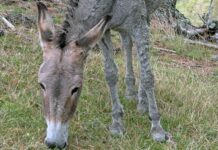
Roosters are still being dumped at Onetangi Sports Park to live a miserable, survival-of-the fittest kind of life, and it needs to change.
Since Haley Wilson, who ran the Friends of the Onetangi Roosters group, moved off the island late last year, Fiona Ward has taken over.
“It really is a team effort,” she says.
Fiona has instituted a ‘rooster roster’ so that volunteers now feed and water the birds daily.
“The roster makes sure someone visits every day, but there are also many people who randomly show up with extra food, which is nice,” she says.
She is backed by another volunteer of five years Kim Brinster.
“It’s lovely we have a community who looks after them, but it is not rooster utopia,” Kim says.
“They are not just pretty birds. They fight with each other, have no shelter, and because they are domesticated animals, they depend on the volunteers for food.”
The roosters also face the risk of diseases such as scaly leg mite, salmonella and bumble foot.
Will Trusewich, who founded the group’s Facebook page alongside partner Sue Sharp, believes the first rooster colony appeared at Matiatia Wharf.
“The original Friends were founded by John Newton, Faye Storer and probably others, 14 years ago,” he says.
The roosters were moved to the sports park entrance at some point, where different volunteers helped out and eventually met.
The Facebook page was created in November 2014 and so the expanded Friends grew.
“We started to learn about the social clusters and their roost trees and knew most birds by name and personality,” Will says. He mentions dearly-loved favourites like Hoppy, the Colonel, Little Hippy, Fabio, a dandy neurotic, and Little Red who was as fast as Roadrunner.
About 50 of the roosters met terrible fates in October last year, when a group of teenage boys terrorised and eventually killed them.
But there are still many roosters at the grounds fighting to survive.
“There are always new ones,” Fiona says, “And some of them have obviously been someone’s pets because they are so tame. Sadly, because they are less frightened, these are the ones most at risk of being harmed.”
As to how people can help and what the alternatives to dumping roosters are, there are plenty of possibilities.
“People have the right to have chickens, but they also have a responsibility,” Kim says.
Fiona adds: “People should either not have a rooster with their hens or keep them contained so they can collect all the eggs and not end up with unwanted males. If they want new chooks, it’s better to get rescued battery hens than allow their existing ones to breed.”
If the situation does occur, and you want to rid yourself of a rooster, the sports park is not a humane option. In addition, dumping is illegal, incurs hefty fines and Waiheke Police keep a close eye on the park.
Kellie Philcox and Pete Dobson at Sunshine Valley in Orapiu will take unwanted roosters and humanely dispatch them. Contact their Facebook page ‘SunshineValleyCo’ or phone 027 671 2991 to arrange a time.
If you would like to help the roosters already at the park, you are welcome to drop by with leftover food. The Friends group emphasises that the roosters should not eat anything mouldy or rotten, citrus, onion or seafood.
“But if people have food that pantry moths have got into, the bugs are a bonus for the roosters,” Fiona says.
Kim adds: “We pride ourselves on our concern for the environment and nature on Waiheke and I think there’s disconnect with how we’re dealing with these birds.”
Find ‘Friends of the Onetangi Roosters’ on Facebook to become part of the
volunteer community or for advice on how to manage chickens. • Emma Haas






